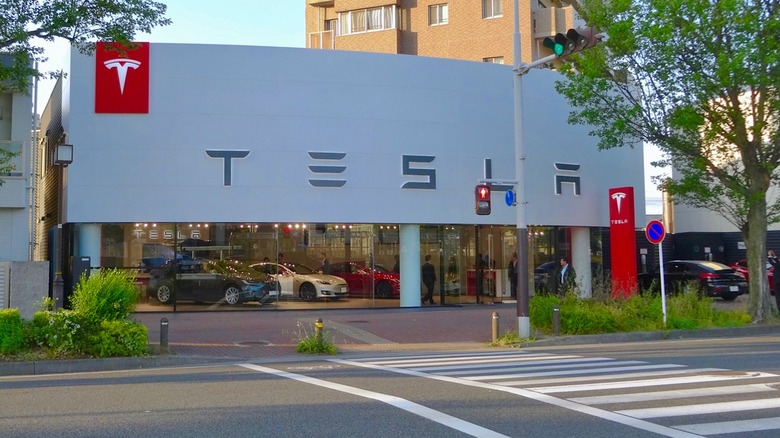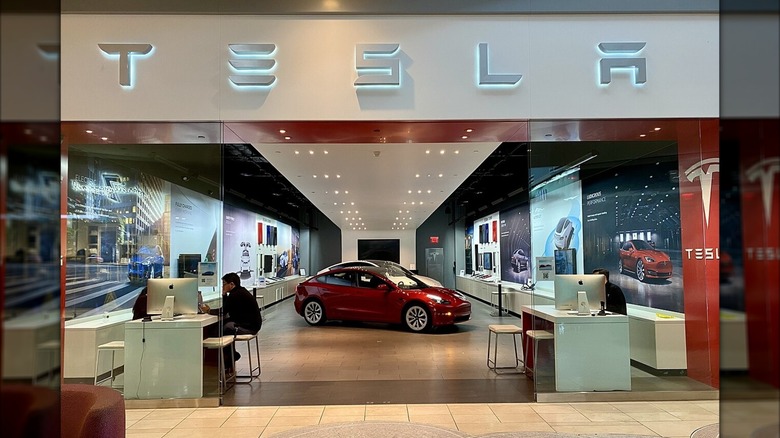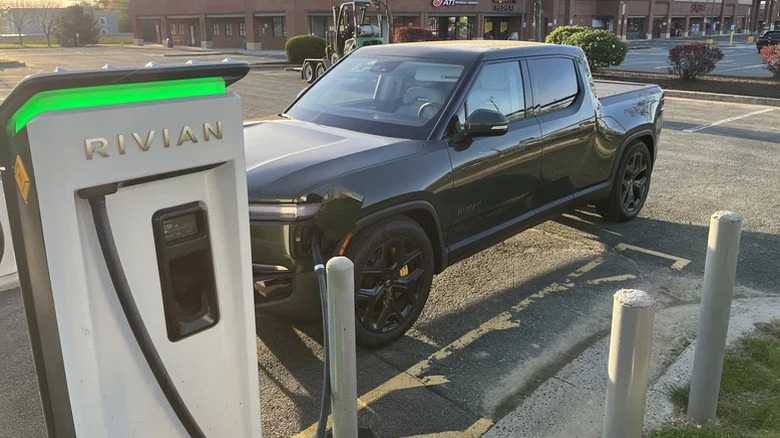Why Tesla Can't Open Dealerships In Wisconsin
Tesla is currently the most successful electric car manufacturer in America, with multiple models included in the list of the best-selling EVs in the U.S. There would likely be even more Teslas on the road if the company had a greater number of dealerships around the country. At the moment that's impossible in several states. You won't find Tesla dealerships in Wisconsin, for example, because they are strictly forbidden by law. The automaker — and CEO Elon Musk — seek to change that, with Musk recently investing millions to political races in the state hoping that his preferred candidates would change current policy.
Tesla isn't banned because it sells electric cars or because of its controversial CEO. A state law from the early 1990s bars Tesla — or any other automaker for that matter — from offering its vehicles directly to consumers. They must instead sell them to third party dealerships, which then sell them to the public at a profit. This is traditionally how most people have bought or leased their cars in the past, often while having to deal with stressful haggling, pushy salesmen, and costly mistakes you want to avoid when buying a car at a dealership.
Since its founding, Tesla has sold its EVs, like the Model Y, directly to consumers, either online or through one of its showrooms. This not only makes more money for the company by cutting out the middleman, but supposedly makes the user-experience easier. It also allows the manufacturer to earn additional profit by directly handling repairs and controlling monthly subscription costs for extra features (a tactic more and more traditional automakers have been learning to adopt). Even if Tesla manages to get the law in Wisconsin changed, there would still be several other states that make bypassing dealerships illegal.
Laws vary from state-to-state — and some have important loopholes
During the very early days of the auto industry, automakers chose to sell their products through third party dealers so they could focus on manufacturing. Eventually, dealership associations across the country became powerful political lobbies and pushed states to pass laws that protect them from having to compete with the companies actually making the cars, as the latter could sell them for cheaper. Today, automakers like Tesla are banned from directly selling their cars in over a dozen states besides Wisconsin: Alabama, Alaska, Connecticut, Iowa, Kansas, Louisiana, Nebraska, New Mexico, Oklahoma, South Carolina, Texas, and West Virginia. Nine other states legalize direct sales but with strong limits — for instance, North Carolina allows six such dealerships, while Mississippi only permits one.
Since each state passes its own laws, no one statute is exactly the same as the other, resulting in caveats and loopholes that companies like Tesla can exploit. Even in Wisconsin, Tesla has public galleries that market their EVs, though they're forbidden from selling them or even discussing pricing with visitors. These storefronts can guide potential customers to buy Teslas in other jurisdictions or online, but some states — such as Kansas and West Virginia — go the extra mile and ban them as well.
Tesla uses loopholes in Texas and Louisiana laws to sell its EVs through "service centers." In some states, direct sales can be conducted on Native American lands if arrangements are made with the tribes controlling that territory, such as the deal Tesla arranged with the Mohegan Tribe to open a showroom in Connecticut. (Connecticut also allows automakers to directly lease — but not sell — in the rest of the state.)
Tesla isn't the only automaker pushing back on these laws
Tesla isn't the only relatively new automaker on the block that is hurt by dealership franchise laws. Rivian is another EV manufacturer that uses a direct-to-consumer model, so if you want to buy yourself the "wickedly quick" 2025 Rivian R1T TRI, you need to do so straight from the automaker. That means there are many states, like Wisconsin, where you won't find any Rivian dealerships at all.
While not as headline-making as Elon Musk, Rivian CEO RJ Scaringe has not hidden his contempt at current policy, telling reporters that direct sales laws are a "horrific state-by-state level of rules that are as close as you can get to corruption." Scaringe also expresses his frustration at why the statutes exist in the first place, saying "I think you essentially have, like, lots of dealers [that] have paid for laws that make it really hard for us to interact directly with the consumer."
Because traditional automakers like Ford and General Motors have been using third party dealerships for decades while companies specifically founded to make and sell EVs, like Tesla and Rivian, use direct-to-consumer models, these laws also give the former a big advantage. Tesla may have had a head start introducing electric cars to the mainstream American market, but the Big Three, as well as foreign companies like Toyota, Honda, Volkswagen, and BMW, are increasing their EV sales year by year — thanks in part to having many more locations where they're allowed to be sold. Eliminating dealership franchises laws like Wisconsin's may be necessary for Tesla, Rivian, and other startups to successfully compete with these manufacturers in the future, which is why you shouldn't expect them to stop trying anytime soon.


